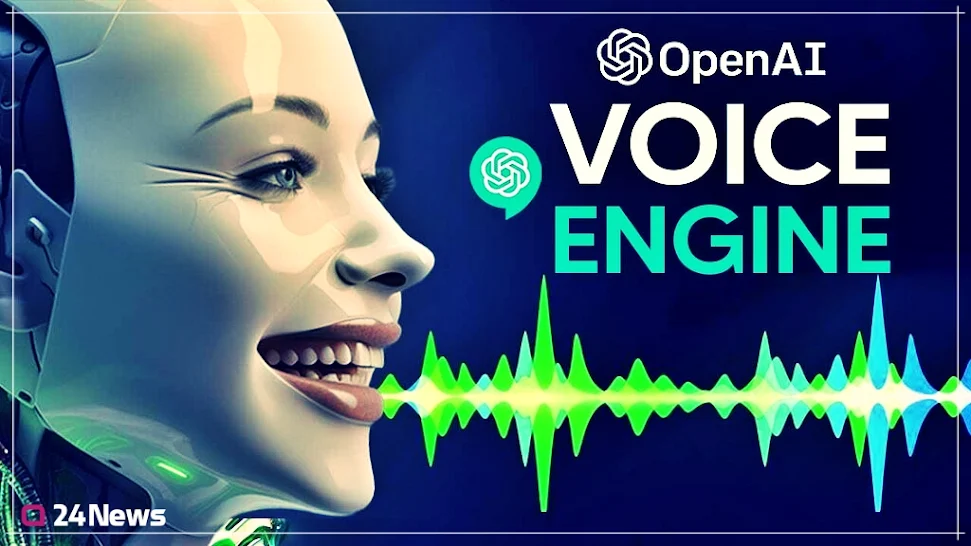Unlocking the Future of Audio Generation
In artificial intelligence innovation, OpenAI has again taken a leap forward with its latest tool, the Voice Engine. This cutting-edge system supports audio replication in a mere 15 seconds, marking a significant advancement in the field of generative AI technology.

Introduction: Breaking Boundaries in Audio Replication
At OpenAI, we are dedicated to pushing the boundaries of what is possible with artificial intelligence. With the development of Voice Engine, we have introduced a revolutionary tool that enables users to replicate audio with unparalleled accuracy and efficiency. In this article, we will explore the capabilities of Voice Engine and its potential impact on various industries.
Understanding Voice Engine: A Game-Changer in AI Technology
Voice Engine represents a paradigm shift in audio replication technology. Unlike traditional methods that require extensive training data and computational resources, Voice Engine can generate lifelike audio using just a 15-second audio sample. This breakthrough has far-reaching implications for industries such as education, translation, and accessibility.
How Voice Engine Works: Unveiling the Magic Behind Audio Replication
Voice Engine leverages state-of-the-art deep learning algorithms to analyze and mimic the nuances of human speech. By training on diverse datasets, Voice Engine can capture subtle variations in tone, pitch, and emotion, resulting in highly realistic audio output. This process enables users to create custom voices for a variety of applications, from virtual assistants to audiobooks.
Applications of Voice Engine: Transforming Industries Through Audio Innovation
Voice Engine has the potential to revolutionize a wide range of industries, offering new opportunities for creativity and innovation. Let's explore some of the key applications of this groundbreaking technology:
1. Education: Enhancing Learning Experiences Through Audio Instruction
Imagine a world where students can receive personalized audio instruction tailored to their individual learning styles. With Voice Engine, educators can create immersive educational content that engages students and enhances comprehension. From interactive language lessons to audio textbooks, Voice Engine has the power to transform the way we learn.
2. Translation: Breaking Down Language Barriers With Natural-Sounding Speech
Language should never be a barrier to communication. Voice Engine enables seamless translation between languages, allowing users to convert text into natural-sounding speech in real-time. Whether facilitating cross-cultural communication or enabling access to information in multiple languages, Voice Engine promotes inclusivity and accessibility on a global scale.
3. Accessibility: Empowering Individuals With Speech Impairments
For individuals with speech impairments, Voice Engine offers a lifeline to communication. By generating custom voices that reflect their unique speech patterns, Voice Engine empowers users to express themselves with confidence and clarity. From assistive communication devices to voice-enabled interfaces, Voice Engine is driving innovation in accessibility technology.
Conclusion: Embracing the Future of Audio Innovation
In conclusion, Voice Engine represents a monumental advancement in the field of artificial intelligence. By enabling rapid and accurate audio replication, Voice Engine is poised to revolutionize industries ranging from education to accessibility. As we continue to explore the capabilities of this groundbreaking technology, we look forward to unlocking new opportunities for creativity, expression, and innovation.
FAQs (Frequently Asked Questions)
1. How accurate is Voice Engine in replicating audio?
Voice Engine achieves remarkable accuracy in replicating audio, thanks to its advanced deep learning algorithms and extensive training datasets.
2. Can Voice Engine be integrated into existing applications?
Yes, Voice Engine is designed to be easily integrated into a wide range of applications, offering developers flexibility and scalability.
3. Is Voice Engine available for public use?
While Voice Engine is currently limited in its availability, OpenAI is exploring options for wider deployment in the future.
4. How does Voice Engine compare to other audio replication technologies?
Voice Engine sets itself apart with its ability to generate lifelike audio using minimal training data, making it a highly efficient and versatile solution.
5. What are the potential ethical implications of Voice Engine?
As with any advanced technology, Voice Engine raises important ethical considerations regarding privacy, consent, and misuse. OpenAI is committed to addressing these concerns responsibly as we continue to develop and deploy Voice Engine.
